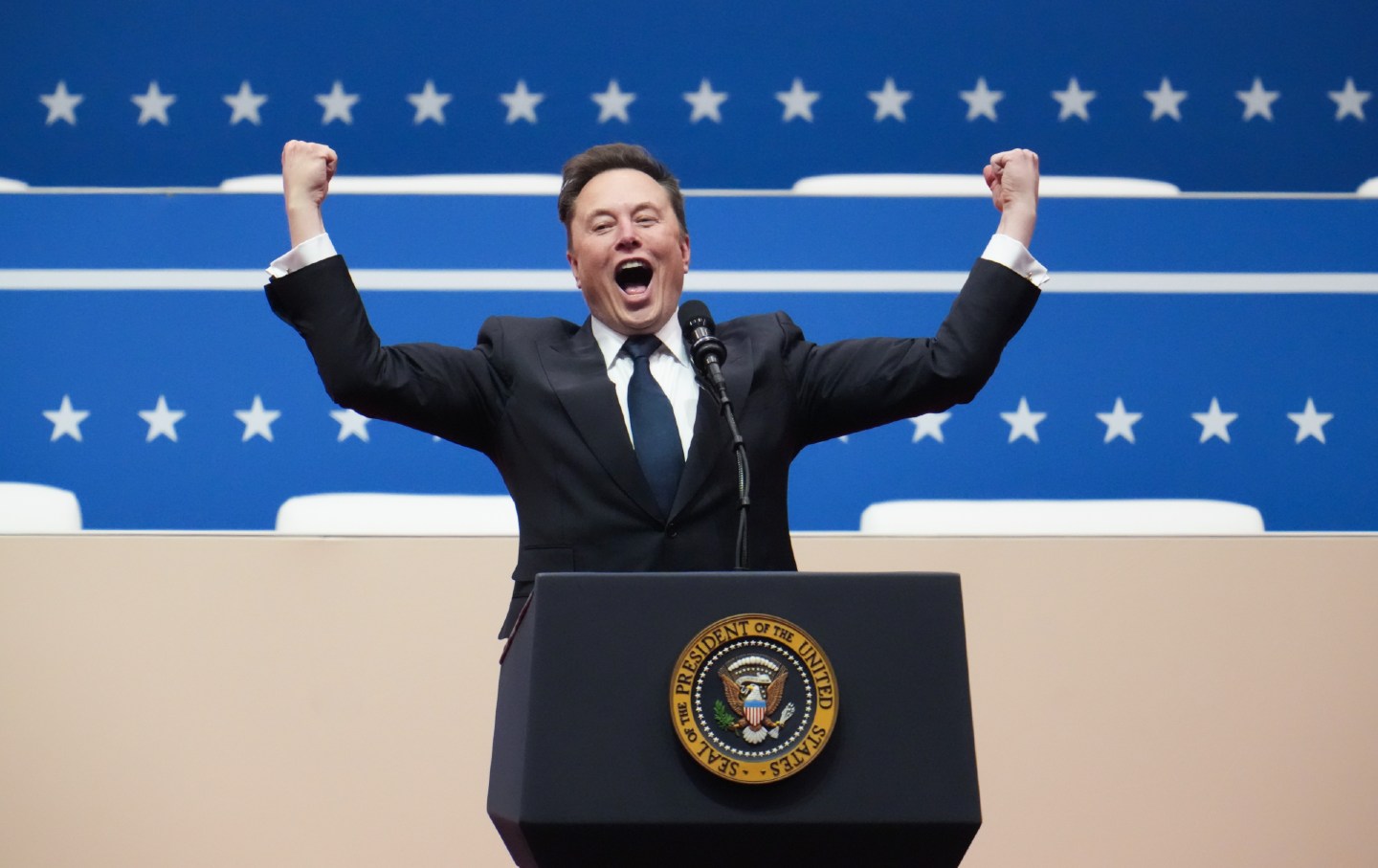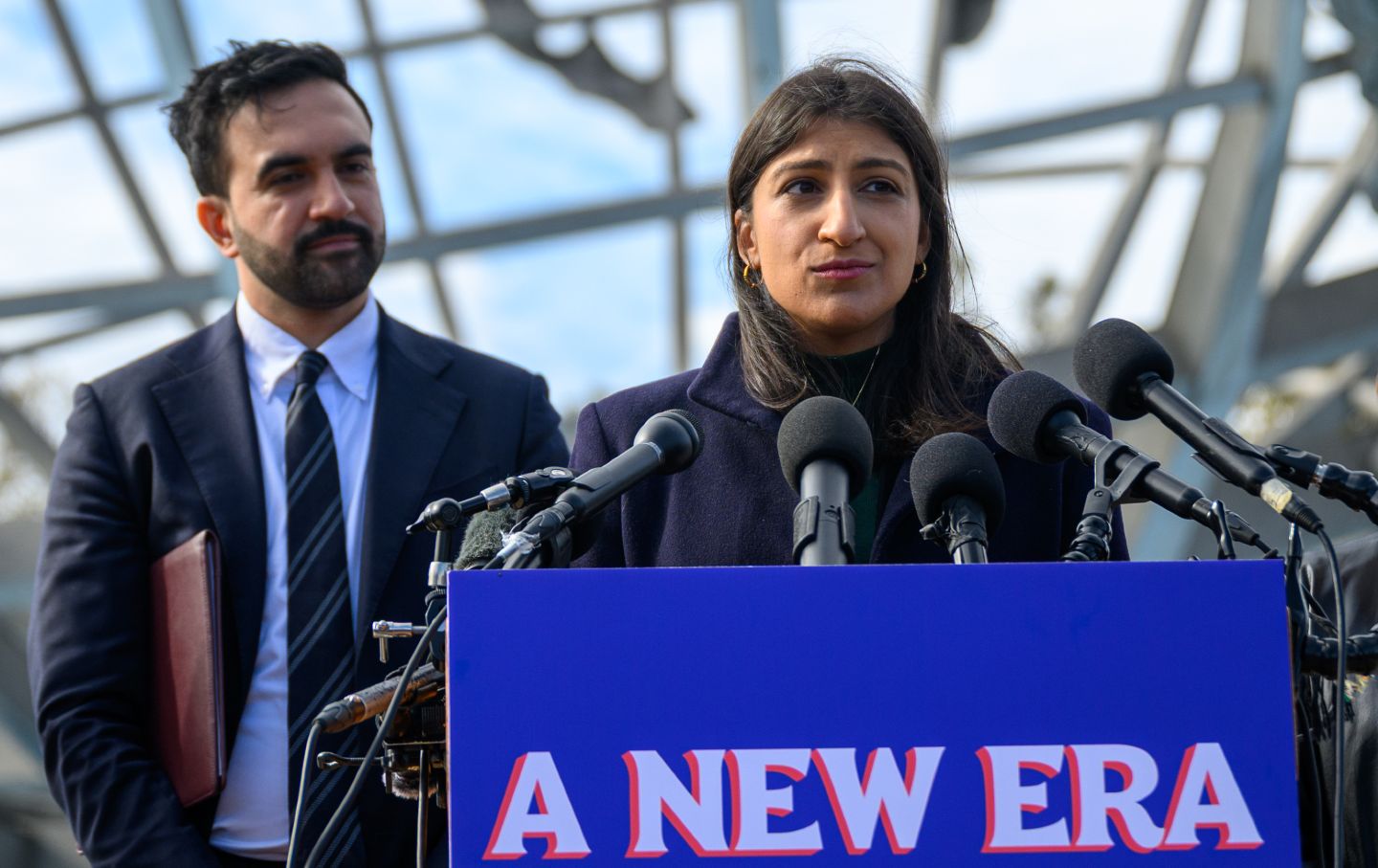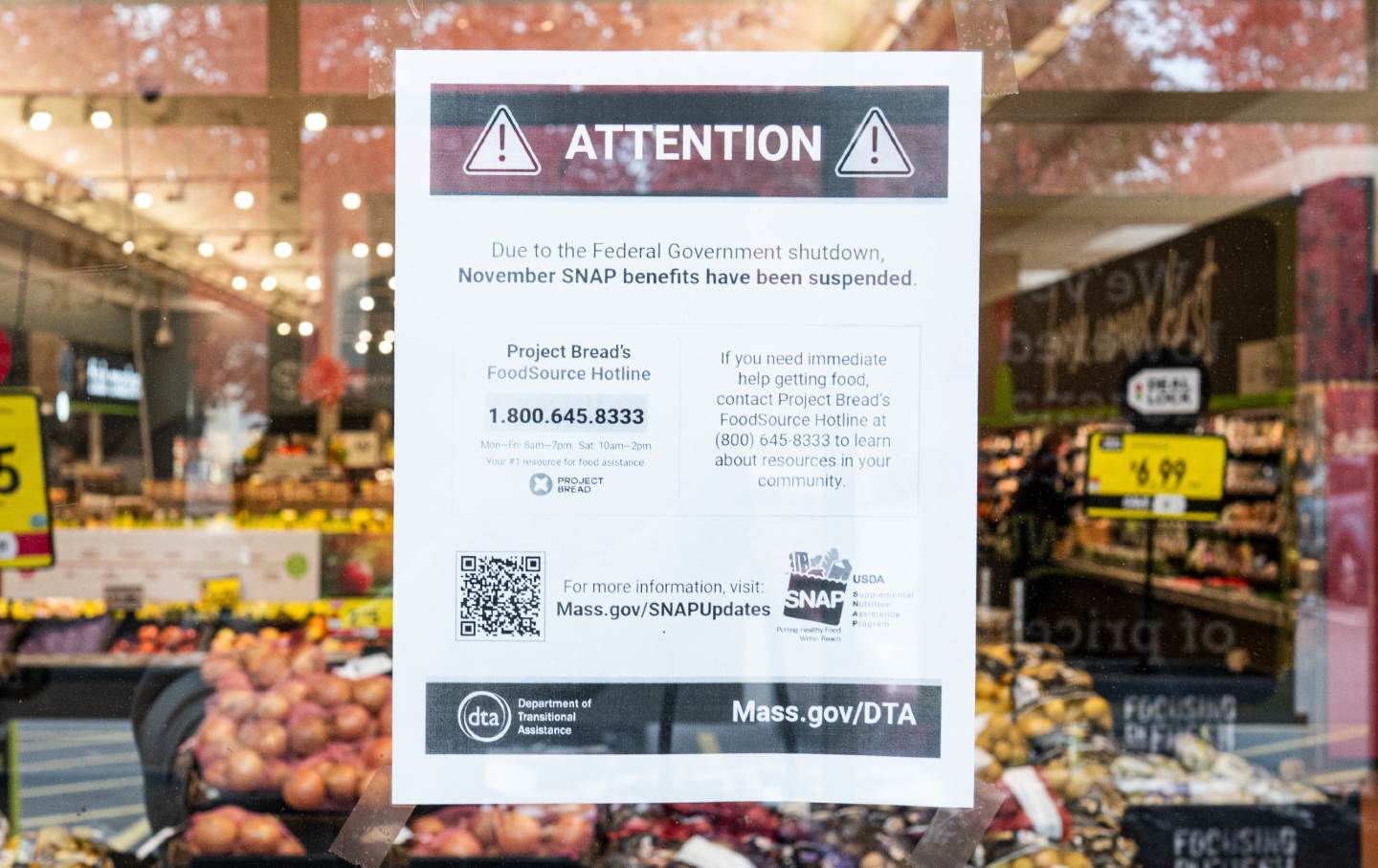Why Elon Musk and the GOP Have the Consumer Finance Protection Bureau in Their Crosshairs
Republicans have long wanted to kill the CFPB. With Musk and Russell Vought, they may finally have their chance.

Elon Musk is very excited to speak during an inauguration event at Capital One Arena on January 20, 2025, in Washington, DC.
(Christopher Furlong / Getty Images)
Months ahead of his killing spree inside various federal agencies, Elon Musk had already singled out one for elimination. “Delete CFPB,” Musk—the conspiracy-minded oligarch helming the run of destruction at the Department of Government Efficiency (DOGE)—wrote last November on X, the social media platform he’s managing into oblivion. “There are too many duplicative federal agencies.”
As ever, the Silicon Valley omni-troll had no idea what he was talking about. The Consumer Financial Protection Bureau was launched in 2011, in the aftermath of the 2008 financial meltdown; its mission was to curb predatory lending and broaden consumer protections in a deregulated financial sector. The bureau’s founding represented the first time that a single agency was charged with pursuing the interests of ordinary consumers in a banking and finance system riddled by massive fraud, self-dealing, and monopoly abuses. You know there is nothing “duplicative” in its functions because investment bankers reviled the agency from the word go—and their leased mouthpieces in the congressional Republican Party have ceaselessly clamored for its demise.
In its 16-year run, CFPB has logged enforcement actions that have returned some $20 billion to consumers bilked by the finance sector. Under its Biden-appointed director, Rohit Chopra, the bureau has worked to reduce the death-spiral of medical debt for working Americans, decreased or wiped out overdraft fees and other penalties for Americans who tapped out checking accounts and ran up charge balances, and sought to regulate the finance and payment apps administered by tech monopolies like Google and Apple.
It’s this latter sphere of activity that propels Musk’s anti-CFPB animus. Musk’s DOGE minions descended on the agency last Thursday, performing their now-standard data heist of documents concerning the nation’s largest financial actors under an ostensible “read only” mandate that rapidly shifted to “ransack at will.” But in this case, there’s a shakedown behind the shakedown, as Bloomberg reporters Jason Leopold and Evan Weinberger write:
Just nine days before his DOGE team visited CFPB, Musk’s X—the former Twitter—announced that it had struck a deal with Visa to process peer-to-peer payments. Musk has publicly mused about expanding into payment-services since he first took control of X in 2022. Entering that business could bring CFPB oversight under rules the agency finalized in November. The records DOGE can now access would include sensitive and potentially competitive information.
In other words, the tech edgelord who exuberantly dispatched an X post reading “CFPB RIP” has decided that his belated move into the digital-wallet sector for his revenue-hemorrhaging vanity social-media property is reason enough to condemn Americans to lethal medical debt, predatory lending, and rampaging fraud.
Of course, Musk is also an obliging blunt instrument in the broader Republican assault on CFPB. Trump had already canned Chopra early into his second term, and provisionally installed Treasury Secretary Scott Bessent as its acting head. But that makeshift plan soon yielded to an administrative death sentence, as newly confirmed Office of Management and Budget director Russell Vought, the Christian nationalist zealot who’d overseen Project 2025, took the reins. Project 2025 devoted an entire chapter to the sacred cause of wiping out the CFPB, which in the florid reverie of author Robert Bowes was “a shakedown mechanism to provide unaccountable funding to leftist nonprofits politically aligned with those who spearheaded its creation.”
Vought wasted little time in reciting from the same hymnal. In his own X post over the weekend, the MAGA-ratchik announced that he was zeroing out the agency’s next round of funding from the Federal Reserve, claiming its present $700 million surplus was “excessive in the current fiscal environment,” and that “this spigot, long contributing to CFPB’s unaccountability, is now being turned off.” Vought also e-mailed CFPB officials to direct them to cease issuing guidances and rules, to suspend public communications, and to shutter all legal actions and supervisory activity—a de facto cry of “Olly olly oxen free” to bad actors in the financial sector. The CFPB has instructed employees to stay home all this week as the MAGA-led disembowelment proceeds.
The National Treasury Employees Union, which represents staffers at CFPB, has filed suit to block Vought’s order; the union has also filed a separate suit seeking to rescind Vought’s authorization of the DOGE team to access the agency’s internal communications system. It’s unclear whether the complaints will have much practical effect, however, against a Trump White House increasingly disinclined to abide by court rulings.
A handful of critics within the MAGA movement have pointed out that it’s far from a boon to the ostensible “populist” Trump brand to unloose the world’s richest man to execute a contract hit on basic consumer protections in a grossly unequal financial sector. Unless Musk’s self-dealing rampage is curbed, writes Sohrab Ahmari, the right-wing pundit who veers left on economic issues, in Unherd, “Trumpians will end up betraying the millions of working-class and union households who pulled for them in last year’s election seeking immigration sanity and economic protection—not to make it easier for Big Finance to surveil and debank them, or for Musk to use his new government job to stymie organising efforts at his firms.”
Indeed, not long before the November election, a few GOP members of Congress, which included the Republican chair of the House Financial Services Committee, Patrick McHenry, actually praised Chopra for his testimony at the House Financial Services Committee, as he outlined a new rule for bankers and financial institutions. That show of common purpose now seems as alien to the raw oligarchic agenda of Trump 2.0 as the substance of the rule in question: It sought to give consumers greater control over who could review and circulate their financial information. Score another one for Elon Musk.
Disobey authoritarians, support The Nation
Over the past year you’ve read Nation writers like Elie Mystal, Kaveh Akbar, John Nichols, Joan Walsh, Bryce Covert, Dave Zirin, Jeet Heer, Michael T. Klare, Katha Pollitt, Amy Littlefield, Gregg Gonsalves, and Sasha Abramsky take on the Trump family’s corruption, set the record straight about Robert F. Kennedy Jr.’s catastrophic Make America Healthy Again movement, survey the fallout and human cost of the DOGE wrecking ball, anticipate the Supreme Court’s dangerous antidemocratic rulings, and amplify successful tactics of resistance on the streets and in Congress.
We publish these stories because when members of our communities are being abducted, household debt is climbing, and AI data centers are causing water and electricity shortages, we have a duty as journalists to do all we can to inform the public.
In 2026, our aim is to do more than ever before—but we need your support to make that happen.
Through December 31, a generous donor will match all donations up to $75,000. That means that your contribution will be doubled, dollar for dollar. If we hit the full match, we’ll be starting 2026 with $150,000 to invest in the stories that impact real people’s lives—the kinds of stories that billionaire-owned, corporate-backed outlets aren’t covering.
With your support, our team will publish major stories that the president and his allies won’t want you to read. We’ll cover the emerging military-tech industrial complex and matters of war, peace, and surveillance, as well as the affordability crisis, hunger, housing, healthcare, the environment, attacks on reproductive rights, and much more. At the same time, we’ll imagine alternatives to Trumpian rule and uplift efforts to create a better world, here and now.
While your gift has twice the impact, I’m asking you to support The Nation with a donation today. You’ll empower the journalists, editors, and fact-checkers best equipped to hold this authoritarian administration to account.
I hope you won’t miss this moment—donate to The Nation today.
Onward,
Katrina vanden Heuvel
Editor and publisher, The Nation








